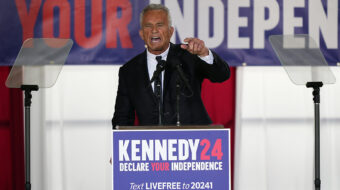There’s a notion being discussed in coffee shops, on the Internet and in public forums across Wisconsin these days. It goes by the ominous name, “The Roggensack Rule,” and is generally acknowledged to be an imperative Wisconsinites could gladly do without.
What is the Roggensack Rule? We’ve all heard of Citizens United, that infamous Supreme Court ruling in 2010 which allowed corporations to be-how shall one put it?-more involved in our electoral process than ever before. Well now we have in Wisconsin the logical extension of that ruling. If adopted, “The Roggensack Rule,” named after Justice Patience Roggensack who is seeking reelection this April for another 10-year term, would make it entirely legal for any corporation to make campaign contributions to sitting judges, even when said corporation has a case before the court.
So, if I am the CEO and chairman of ABC Corp., and I am being sued by some annoying environmentalist organization, I can give a rather handsome contribution to the judge who will rule on this case. And I can do this with impunity, or as Roggensack likes to put it, in the name of “free speech.”
Now why in the world would I, CEO and chairman of ABC Corp., give a sitting judge up for re-election a whopping contribution? Is it because I am interested in justice? Perhaps it is my devotion and support of the democratic process. Forget the free speech dodge, that’s just a red herring trying to divert us from the real motive behind this act; only the most gullible would entertain any other reason than the fact that I want to use my financial clout to influence the outcome of my case. I am, in effect, bribing the judge, and if Roggensack has her way, I am doing so legally.
And why, pray tell, would I want to do such a thing? Is it because I think the arguments of the environmentalists are bogus? Do I feel that they are so fundamentally and morally wrong that I have to resort to such a dire tactic as bribery? Is it because bribery is less offensive to the American people than what those exasperating environmentalists want? Only the most gullible would buy that reason.
No, my only motive to dump large sums of money in this way is that I clearly see a return on investment: my shareholders, that small group of wealthy individuals, will greatly profit by a decision going the “right” way in the courts.
It’s almost unfathomable to try to comprehend how a judge with any scruples could move up through the ranks, through the years, and display such contempt for impartiality. Impartiality-that essential component of justice-is the best we can hope for if we want the courts to be fair. Judges have recused themselves, and are expected to do so, if there is even a perception of impartiality. They have shown that it is always best to err on the side of fairness.
But the times are a-changing! With Citizens United and now “The Roggensack Rule,” in the light of day judges can be wined and dined by the very party they will be ruling on.
After all, corporations are people, and shouldn’t all people have rights?; to wit, the right to be enterprising and take advantage of any situation to make a buck? And so these very corporations have persuaded Lady Justice to put away her blindfold so she can lift her scales-to the highest bidder.












Comments